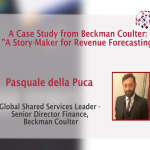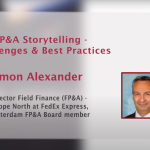At the recent FP&A Trends Webinar, senior finance professionals from diverse backgrounds and experience shared their...

“Not that the story needs to be long, but it will take a long while to make it short.” Henry David Thoreau, Essayist.
When we discuss the emerging skills required for the modern FP&A professional, storytelling skills are rated highly.
However, for many of us, this is not a skill that is quickly learnt. The art of taking complex information and turning it into a relatable story takes time. That time imposition is not always down to poor data, processes, or systems. Time is also required to understand how to engage with your audience. That is time well spent!
How do you know if your reports and visualisations are really adding value and making sense to your intended audience? Do you take the time to find out?
Below is a short recount of an experience of mine.
Is the value in the report, or how do you explain it?
I am a volunteer committee member for a small not-for-profit organisation and prepare financial performance reports.
At one meeting, whilst discussing the year-end position, a committee member suddenly stated they did not have visibility of organisational performance and was surprised at the year-end position.
This bemused me. The breadth of the reports and information I stitched together was more than required for an organisation of its size.
With my reporting pride dented, I put together new visuals to reinforce the narrative to ensure the messaging would suit the range of understanding and experience of the committee. I presented them with various visual and tabular approaches, and I asked them what was most useful.
Did I nail it? Not immediately. No visual, table, or narrative I concocted in the following months universally hit the mark.
What I did achieve, however, was greater interest, engagement, and discussion. More questions followed, and I was able to explain things that previously had not been fully understood. Such as how the budget assumptions were made, the difference between cash and accrual accounting, and the relationship between the P&L and the balance sheet.
So, what had I missed in the first place?
Understand your audience – don’t assume that you do
There was nothing particularly wrong with my original report's content detail and delivery. However, I hadn’t proactively sought feedback to ensure it was fully understood.
I had assumed that basic operational knowledge and financial acumen were consistent among the members, and when a new member started, I didn’t take time out to understand what their experience was.
When no comments or questions arose in meetings, the report was taken as read.
In the end, they all needed additional explanations to understand what the reports really meant.
What I now prepare is remarkably like the original reports, and all the time spent on other versions could be interpreted as wasted effort and time.
I don’t see it that way, however, as the process was a learning experience, and the committee's collective understanding of how the finances link to operations is greater as a result.
A reminder that engaging with your audience is the valuable partnering aspect of the FP&A role we should all invest time in. Regardless of the organisation, you are in.
How do you know if you are getting it right?
You are on the right track when you are being asked prompting and clarifying questions.
If a constructive discussion has occurred, this is a good sign. It suggests that you have engaged with your audience in the right way. They are either interested in understanding more, or they have an appreciation of what it means for them.
If someone says they don’t understand your reports, this is still a positive sign. The discussion has begun, and this can be valuable feedback to tweak your reports in the future.
If you are met with silence, it is likely no one is seeking to understand. Perhaps they don’t think they need to engage as they don’t think it is relevant to them.
Consider psychological safety as well. In formal settings, some may not want to be perceived as lacking knowledge and will not want to ask questions while others are listening.
This is a cue to arrange a time with your key stakeholders to ensure they appreciate the relevance of their role and their part in decision-making and provide them with the opportunity to ask questions in a safe setting.
Continue to ask for their opinion about your presentations and reports and how they use them.
Time, practice and patience
Picture 1
And here lies the challenge for FP&A professionals. We know those insights have the greatest value when they are delivered and can be actioned in a timely way.
The issue - it takes time and patience to engage and practice to get it right – where does that time go? If it is on the following, have comfort that it is time well spent:
Understand your message – what is the story to be conveyed from your data and insights? Validate the information and formulate recommendations.
Understanding your audience – do you know their background to pitch complexity and technical aspects at the right level?
Tailor to your audience – sometimes, the part that takes the longest is distilling complex data into succinct digestible facts and visuals in the right sequence.
Seek feedback – this is probably the quickest thing to do, but it is often avoided.
Summary
As FP&A leaders, we need to enable our teams to find time and opportunities to develop their ability to craft the story, create business relationships and be comfortable eliciting their feedback. It will take time, but it is time well spent.
Subscribe to
FP&A Trends Digest

We will regularly update you on the latest trends and developments in FP&A. Take the opportunity to have articles written by finance thought leaders delivered directly to your inbox; watch compelling webinars; connect with like-minded professionals; and become a part of our global community.







